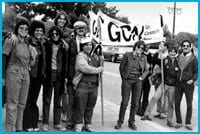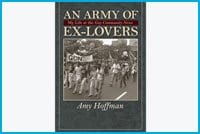Flipping the pages of a queer publication in the 1970s rarely offered suggestions on updating your wardrobe or freshening up the furniture. Instead radical lesbians and gay men aimed to recruit you to change the world.
Before the age of gay lifestyle magazines with glossy pages and full-colour consumer ads there was Boston’s Gay Community News (GCN). Started in 1973 and publishing in various formats until 1999 GCN was at that time one of the longest-running queer publications in existence, alongside Toronto’s own The Body Politic (TBP) published by Pink Triangle Press, the same company that brings you Xtra.
Amy Hoffman worked at GCN from 1978 to 1982. Nearly three decades later she revisits that life-altering experience with humour, grace and hindsight in the just-released An Army of Ex-Lovers: My Life at the Gay Community News.
Hoffman revealed herself as a self-aware and touchingly honest memoirist in her first book, Hospital Time, a chronicle of her tempestuous relationship with GCN’s office manager Mike Riegle as he died from AIDS-related complications in the early ’90s. She dives deeper into the past in An Army of Ex-Lovers and what surfaces is not only a portrait of a passionate moment in social history but a tender coming of age tale.
The weekly newspaper was founded during the years of great political ferment following New York’s queer/trans riot at the Stonewall Inn. Boston was a hotbed of activism with many homos involved in the antiwar and feminist movements. Hoffman was a fresh-faced college student in her 20s whose previous publishing experience consisted of sitting on the collective of Sister Courage, a socialist feminist journal.
In the style of the times GCN was also run by collective. Throughout its history the paper was notable for bringing lesbians and gay men together. For the young Hoffman this brought unexpected surprises.
In an era when dykes changed their surnames from Goldman to Womongold she’d anticipated mellow pacifists like the men who did volunteer childcare at women’s events. Instead she was treated to workaday banter about all the cocksucking that transpired in the Harvard Science Center men’s room the night before. “Sometimes, telling these stories, they used female pronouns and called each other Mary,” Hoffman deadpans.
But she came to see that these drag-dabbling anarchists cared deeply about feminism and sought to interrogate their place in a patriarchal world and, in doing so, she developed a lifelong bond with a gay man. Hoffman’s friendship with fellow GCN staffer Richard Burns developed in the context of historical events such as the 1979 March on Washington for Gay Rights, where the twosome struggled comically — and unsuccessfully — to give away thousands of copies of GCN.
In the hostile climate of the ’70s and ’80s GCN provided a lifeline to lesbians and gay men and helped them organize for their rights. The paper posed questions of community and political solidarity that few others were talking about, from features on deaf gay men to interviews with lesbian political prisoners. In the process Hoffman’s view of herself and the world changed. She catalogues a somewhat tongue-in-cheek alphabetical listing of her ever-increasing set of political allies, from abused women to zoophiles.
Over the years GCN had its share of troubles — from the perils of cut-and-paste typography to controversies over nudity and advertising policies. GCN struggled with money but was ambivalent about ads from gay bars. From the perspective of the GCN collective the bars lined the pockets of their straight owners while encouraging alcoholism and shame. “We criticized them but at night we patronized them every chance we got,” Hoffman notes wryly.
Though GCN had paid staff and only missed one issue when a blizzard shut down half of Massachusetts, GCN was not run like a business, because its business was revolution. For years nothing could stop it — shoestring budgets, bullet holes in the office wall, bashings, deaths from suicide, murder or AIDS or the arson that destroyed the GCN office in 1982.
These days it may seem like we don’t have to rebel in order to be free — but the impact of radical publications like GCN continues to be felt. Like Toronto’s TBP the Boston weekly spawned a generation of visionaries who now run queer and AIDS organizations across North America. Hoffman’s highly personal account sensitively evokes a historical moment when queers had so much to lose — and the world to gain.


 Why you can trust Xtra
Why you can trust Xtra


